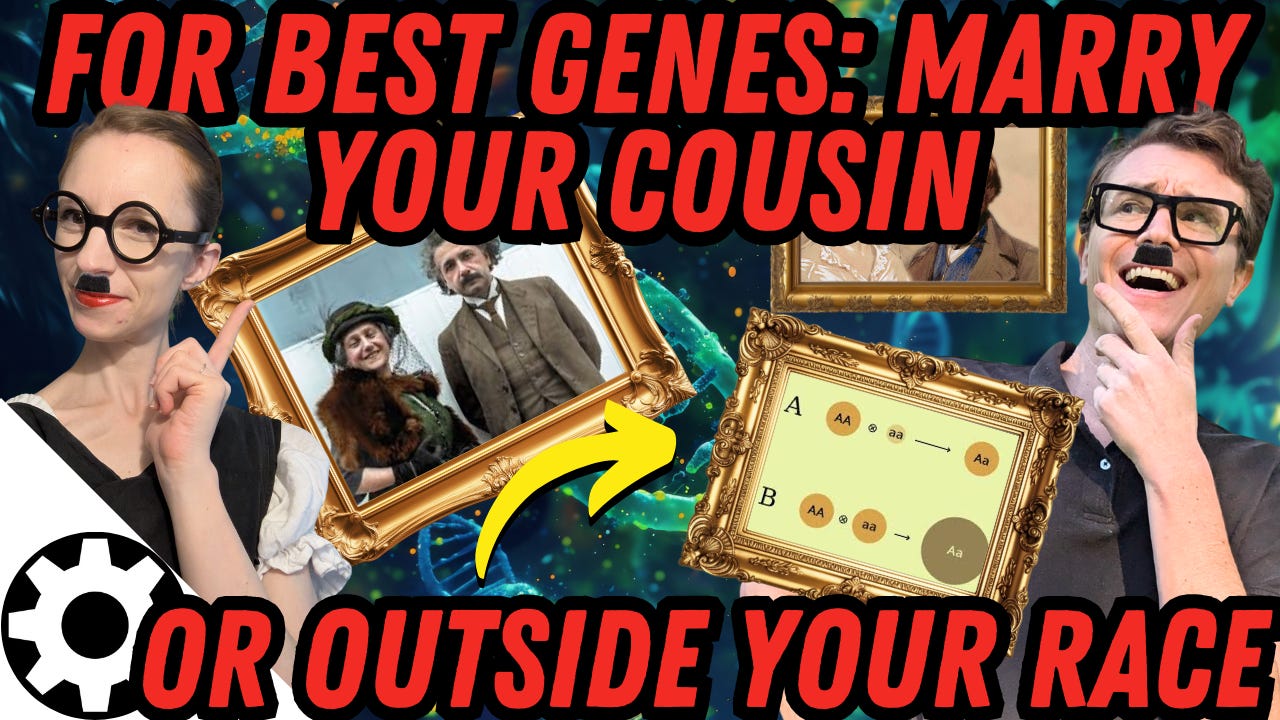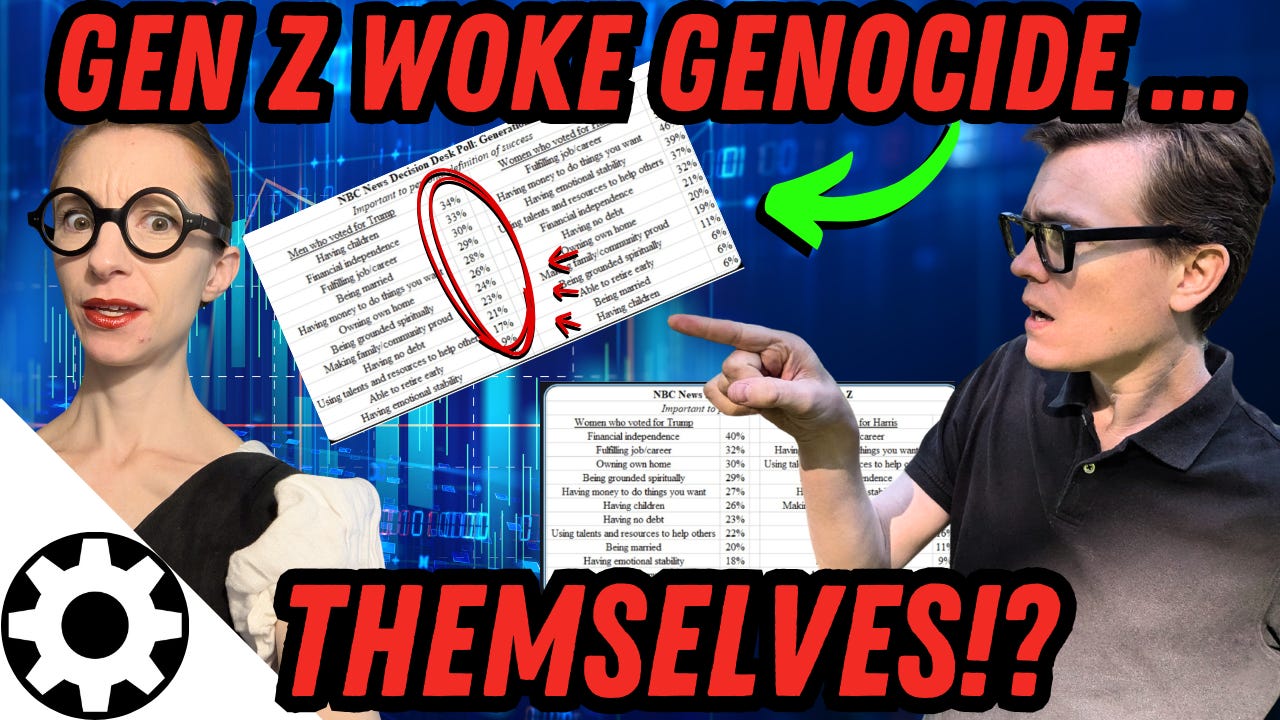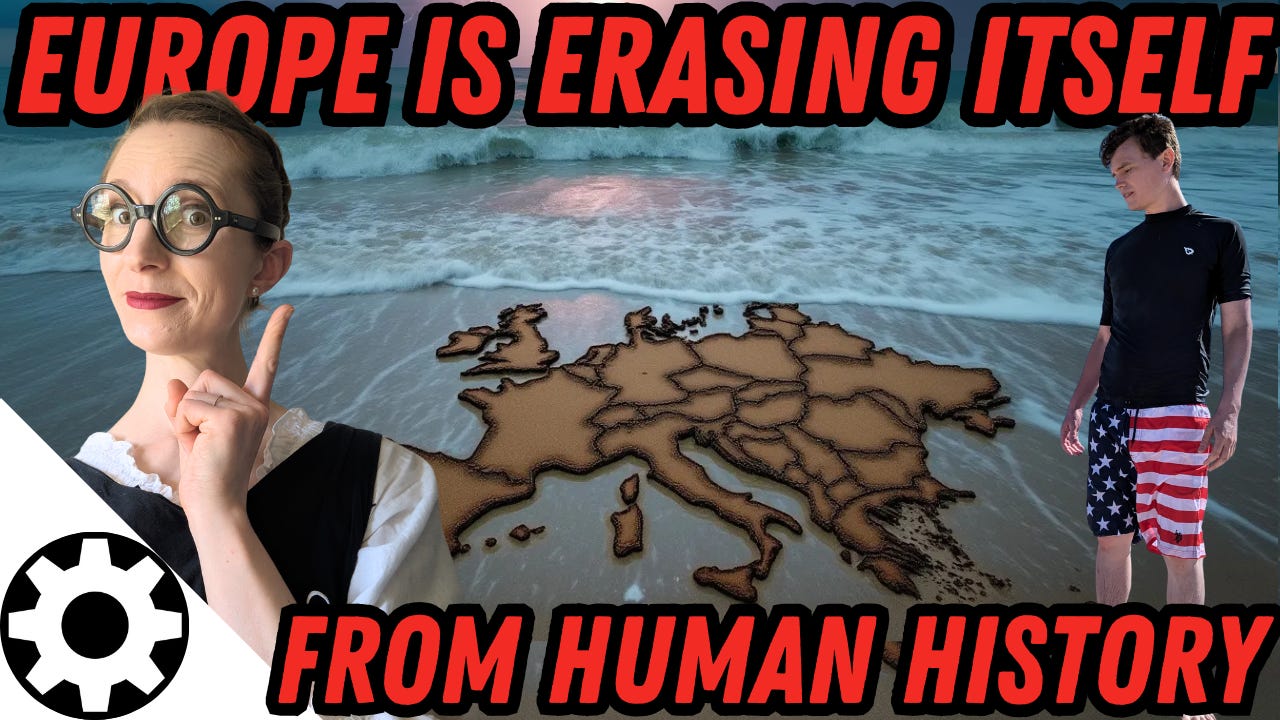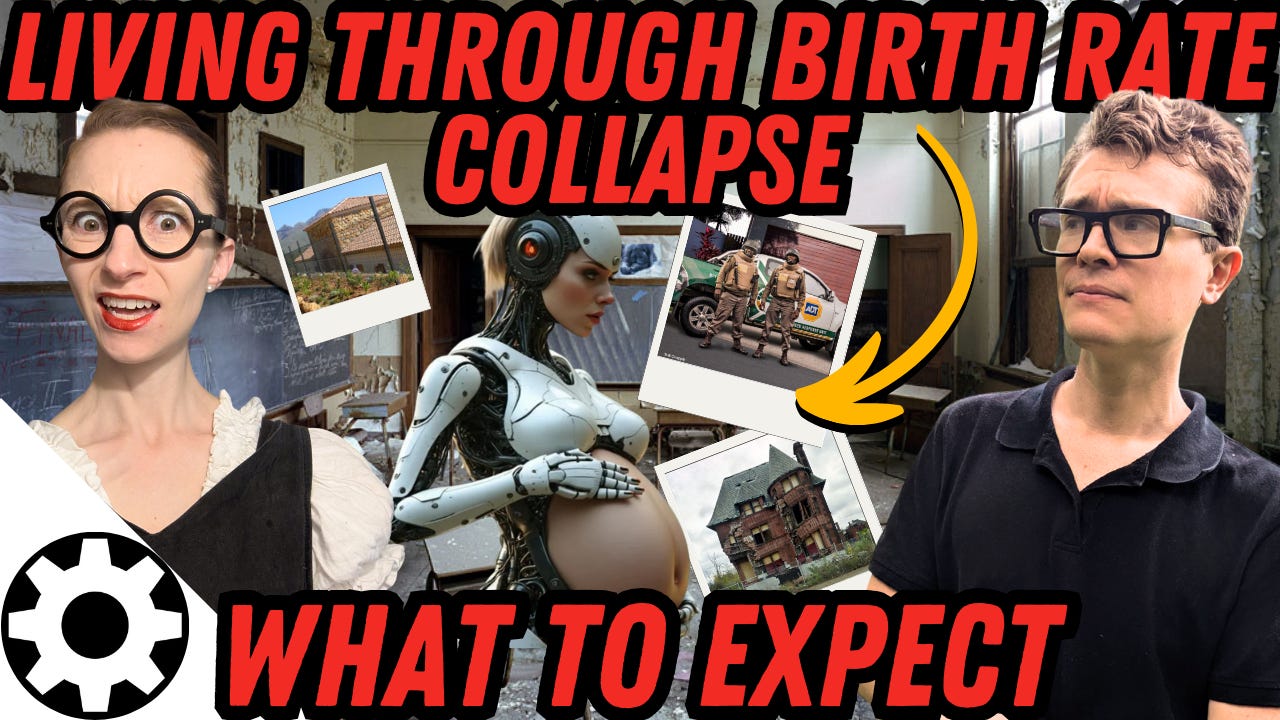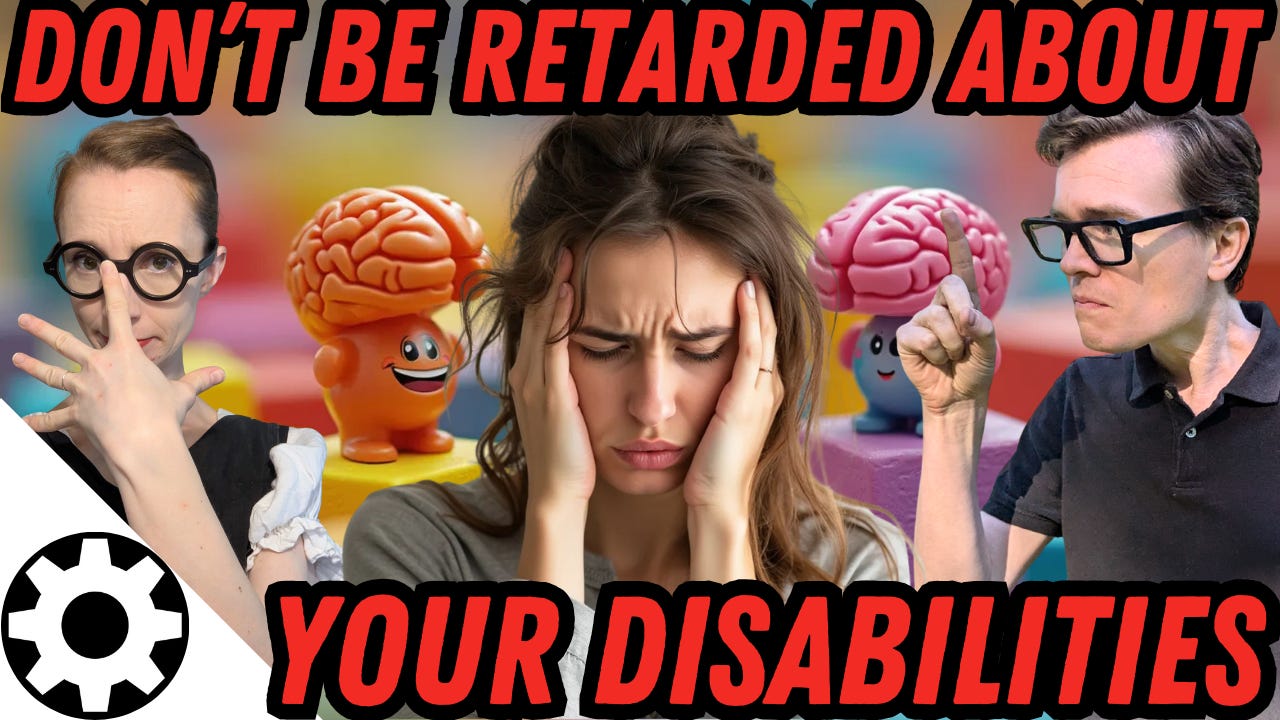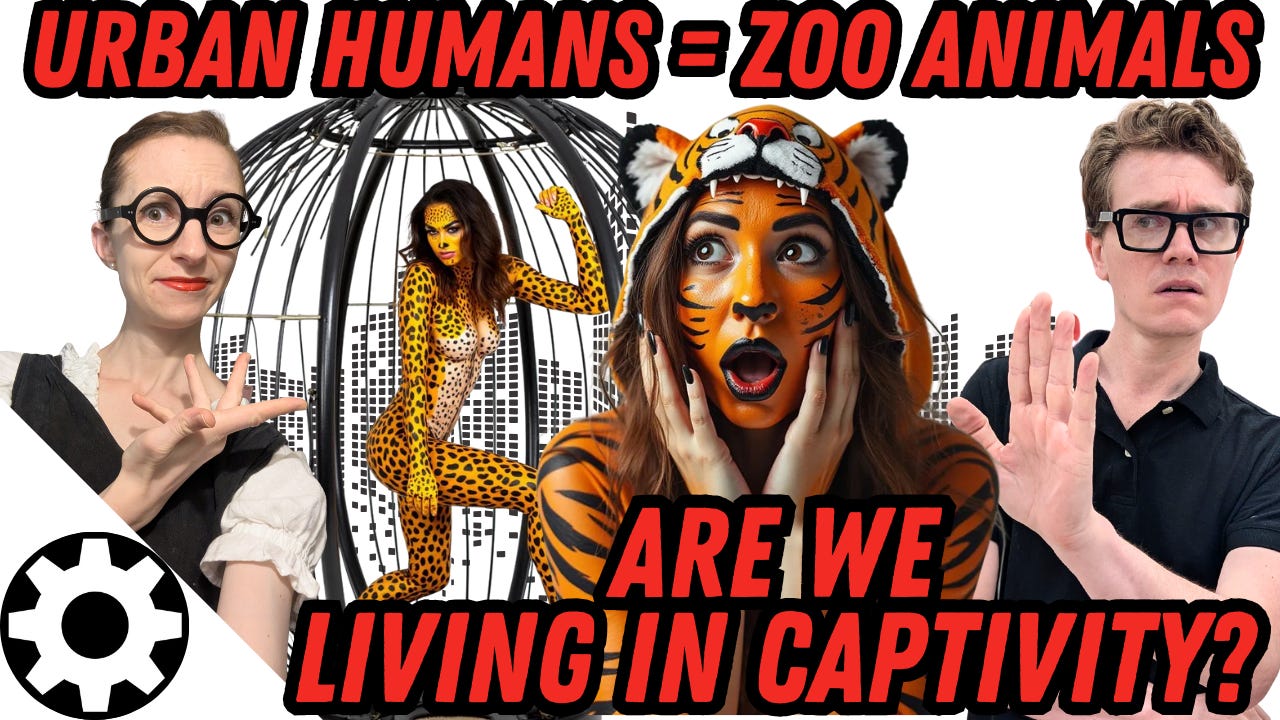Why Cousin & Interracial Marriages Have Better Genetic Outcomes
Description
Join Simone and Malcolm Collins as they dive into the history, science, and controversy of cousin marriage and mixed-race marriage. From Darwin’s pro/con list to modern genetic research, this episode explores the cultural, biological, and personal sides of who we choose to marry. Stay tuned for surprising facts, actionable advice, and a few laughs along the way!
Simone Collins: [00:00:00 ] Hello Malcolm. I'm so excited to be with you today because we're gonna get spicy and extol the virtues of cousin marriage and mixed race marriage
Speaker 4: Mirror universe, encounter mirror, universe. This is easy. Yeah, I can pretend to be evil.
Deal.
Simone Collins: just so you know, wait, hold on,
Malcolm Collins (2): stop. Before you go further. Are we talking about mixed race or just cousin marriage?
Simone Collins: Mixed race and cousin marriage. Oh, really? Yeah. We're going, we're going in for both dude.
Malcolm Collins (2): Continue
Simone Collins: because ultimately I'm gonna argue that you should basically go for one or the other. But
Malcolm Collins (2): Okay.
Either, either marry your cousin or someone of a different race. Yeah, dude.
Speaker: Athens's log star, date unknown. My landing party is beamed back to the enterprise and found it and the personnel aboard chain. The ship is subtly altered physically. [00:01:00 ] Behavior and disciplines become brutal. Savage.
Speaker 3: Did how
this.
Simone Collins: We're gonna go,
Malcolm Collins (2): okay. So go into the genetics of this. Go. Go.
Simone Collins: Let me. Can I, Mr. Tired man. Just let, let me drive, let me cook. All right. Anthropologists estimate that over 80% of marriages in history have been between second cousins or closer.
So basically the default for the vast majority of human history has been people marrying their relatives. And I remember we were walking in, in the Alps in Switzerland, when you really opened my eyes to this, you were like, listen, like look at these hills. Do you think that the people who've lived here for thousands of years were like.
Going far away to marry someone. Like it was really hard. They weren't doing that. They were like marrying their siblings. But, so even today, cousin, marriage rates are pretty high, like especially in parts of the Middle East and North Africa and South Asia. They can meet up to 20 to 50% of marriages to date in countries like Pakistan or Kuwait or [00:02:00 ] Saudi Arabia.
But like, even if you're a, a weird, you know, European urban monoculture person, you should probably be cool with cousin marriage. It, it gave us Charles Darwin, who also in turn was a product of a well he was the product of his second cousin marriage, but he married his first cousin. Yeah. And he's, he's the evolution dude.
I mean he's the evolution dude. Yeah. Yeah. HG Wells. He was, he had first cousin parents. Tons of European royals, obviously. But even Albert Einstein married his first cousin, you know, like the, the smart people are doing it. And then if we go to mixed race, which mixed race, so, so
Malcolm Collins (2): you're a smart guy like Albert Einstein or Darwin, you're marrying your cousin,
Simone Collins: I mean.
And I, do you know about Darwin's list of like benefits and drawbacks of marriage? This man was very thoughtful about it.
Malcolm Collins (2): Oh, he did? He did a list, yeah. Oh my
Simone Collins: God. Oh, okay. Hold on. Sorry. Diversion. You don't know this list. Okay. Charles Darwin, marriage pro and con list. This is too good to. [00:03:00 ] Yeah. So pros of marriage.
So yeah, before he, before he married his first cousin he really thought he, like, he wasn't sure about getting married at all. So before he, he, he married his wife he made a pro con list. Pros of marriage as listed by Darwin. A constant companion and friend in old age children who could be a source of love and play charms of music and female chitchat, a home and someone to care for it.
Okay. Significant things I got, I, I
Malcolm Collins (2): got the pros. So yeah, you got
Simone Collins: the pros. A significant feeling of being humanized and having greater happiness than solitude and. A, a soft wife on a sofa with a good fire, books and music. What a sweet, I love
Malcolm Collins (2): that.
Simone Collins: Sex is not
Malcolm Collins (2): in there for him.
Simone Collins: No, he's, he's autistic. Darwin, he was probably asexual.
So the cons of marriage as listed by Darwin. A terrible loss of time preventing travel or pursuing scientific interests. You know, he [00:04:00 ] had, he had his special interests, Malcolm, the bugs. Okay. The, the animals. Limited freedom to go wherever he pleased. That's a problem. Forced visits to relatives and having to bend in every trifle.
He's not down with that. Also, the anxiety, expense and responsibility associated with children. He was not excited about kids. A reduction in funds, meaning less money for books. Ah, less money for bug. Yes. And less time for evenings out with friends and clever men at clubs. So clever men at clubs.
Clever men at clubs. Yeah. So woman, we chat.
Malcolm Collins (2): You get but not
Simone Collins: clever men. Not clever men. Yes. Yeah. You, you, you. Yeah. He had to trade in Clever men for a soft wife on a sofa with a good fire, books and music, but not as many books.
Speaker 2: Not as many. So he thought
Simone Collins: really carefully about this. Okay. But yeah, I mean like, so obviously like cousin marriage was the historical default because people couldn't get around.
But now mixed race marriage is bigger than ever and getting bigger. 18 to [00:05:00 ] 20% of new marriages in the US are mixed race marriages. They have produced amazing people. Barack Obama, Mariah Carey, tiger Woods, Vanessa Williams. So I'm gonna go through the history of cousin and mixed race, marriage, mixed race marriages, and how the regulation thereof has shaped civilization.
We're gonna talk about the benefits and drawbacks of cousin and mixed race marriage. Mm-hmm. Because there are ways to do it and there are ways to not do it. To be blunt, and I'll share general takeaways. If you wanna be really obsessive Darwin style about producing, do not do it. You're gonna suggest some racial pairings are bad.
I am. Yes. Sorry, but not sorry. But if you wanna have maximally fit kids based on your partner choice, there are ways to do it better than others. So on average oh my God, this my Basecamp. Okay, we're not about to get canceled. It's not we worth doing. And then ultimately I'm gonna explain why basically.
It's, it's optimal to either marry your fourth cousin or third cousin or marry someone from a very [00:06:00 ] specific different genetic heritage based on your sex and personal background. So this is different for men and women. Okay. Very specific. I'm gonna be tactical here. You're gonna come away with actionable advice for either you or.
Marriage planning for children, which is I guess what we're gonna be looking at. And then bonus Malcolm at, 'cause I've, I've looked, I hacked into your 23 and Me account and added you as a contact and I found exactly how much you and I are related. So you get to find out that at the end. 'cause everyone wonders just how related are we?
They, they think that we're brother and sister 'cause. You know, look at us.
Malcolm Collins (2): Well, no, I mean, we are cousin marriage. She's not my cousin, but she could be, I think genetically faking. Well,
Simone Collins: you're gonna find out, aren't you, Malcolm? Are you gonna check that? I already did. I just told you I hacked into your 23 and me account.
I made us connect. Wait, are we related? You have to stay awake long enough to see. You have to wait until the end. I'll give you the screenshot. No, I like [00:07:00 ] and I. I went into your account so I could find our actual Oh my God, Simone, they're totally cousins, aren't we? You're gonna find out. So the history, the history of mixed race marriages and cousin marriages basically genetic and genealogical studies show that before the industrial age, most spouses were on average fourth cousins much more closely related than today's typical partners.
So we've sort of like let go. Which is sad. This may explain a sort of, I mean, the fact that maybe we, we are descended from so much cousin marriage could explain as sort of mating, which, which is the, this phenomenon of people being more attracted to people who resemble themselves. So studies have shown that participants in these studies rate faces morphed with their own features as more attractive.
So they're like take a general face and like. You know, meld it with pictures of them and those people like, Hey, that person's hot. It's really
Malcolm Collins (2): nice. Well, no, there, so the Western Mark effect, many people don't know this. Ooh. Yeah. If you grow up separate from your [00:08:00 ] siblings or your parents mm-hmm. You typically are unnaturally attracted to them when you become an adult.
Yeah. And the only reason you are not aroused by your siblings is because of something called the Western mark effect, which means your body cues to people who are around you and who you have affection

